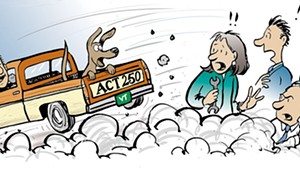Updated on October 6, 2020.
Gov. Phil Scott on Monday evening vetoed a bill he said failed to deliver on the legislature’s long-promised makeover of the state’s signature land-use law.
Instead, he issued an executive order suspending certain reviews of trail networks under Act 250 until an alternate program for assessing impacts of trail construction can be established.
“Nothing in this bill modernizes or improves the Act 250 process — something that is widely agreed to be necessary after fifty years of existence,” Scott wrote in his veto message to lawmakers.
Scott had made his objections to
H.926 well known, especially its additional regulations on the development of forestland that environmental groups say are needed to protect forests from continued fragmentation.
But he said the comprehensive package of reforms his administration and lawmakers worked for years to craft had been so
whittled down that he couldn’t support the final product.
“H.926 ignores all the work and collaboration put into Act 250 reform and is counter to the important outcomes we collectively sought,” Scott wrote. “With this bill, the Legislature has created more regulatory uncertainty, not less.”
Brian Shupe, executive director of the Vermont Natural Resources Council, acknowledged the final bill was a far cry from the
sweeping reform package originally envisioned to help Act 250 better address modern threats such as the climate crisis.
But the more modest bill still included key protections for forests and wildlife, and regulatory clarity for trail networks that the Scott administration had sought, Shupe said.
“From our standpoint, it really undermines the governor’s own priorities supporting the rural recreational economy, and undermines his priority of maintaining a land base for the forest products industry,” Shupe said.
It also enjoyed strong support by lawmakers, particularly in the Senate, where it received 26 of 30 votes in favor, he noted.
In a statement Thursday, Senate President Pro Tempore Tim Ashe (D/P-Chittenden) called the governor’s veto “surprising” given his previous support for the trails and forest fragmentation provisions when included in earlier drafts of the bill.
Ashe also said the governor’s move to issue an executive order in place of legislation passed by lawmakers “raises concerns about the separation of powers between the Executive and Legislative branches.”
Act 250 already requires developers of large construction projects such as ski resorts and subdivisions to avoid negative impacts on air quality, water resources and aesthetics, among other things.
The bill would have added forest impacts to that list by requiring developers to "avoid, minimize or mitigate" land uses that break up forestland and restrict wildlife corridors.
It also called for an 18-month moratorium of Act 250 jurisdiction over existing trail networks until clearer rules could be written.
But Scott suggested that the two provisions were inherently contradictory, seeming to help trail networks by simplifying regulations, but in reality, adding to their headaches by creating confusion for the owners of the very forestland those trails cross.
While much of the debate about whether trail networks need Act 250 review has focused on the burgeoning mountain biking industry, Scott said trail groups like the Vermont Association of Snow Travelers (VAST) have also expressed concern.
“VAST already reports landowners are considering removing their land from the trail network should this law be enacted,” Scott wrote.
His executive order directs Mike Snyder, the commissioner of Forests, Parks and Recreation, to come up with an alternative approval process for regulating trail networks.
Until then, it orders the boards that administer environmental decisions to “take all reasonable steps to delay a final decision in any proceeding addressing Act 250 jurisdiction.”
Ashe, in his statement, noted that that specific aspect of the executive order
"appears to intervene in quasi-judicial proceedings, some of which may be underway at this time.
"Regardless of the issue, or of one’s perspective on that issue, the prospect of gubernatorial intervention in legal proceedings is worrisome," he wrote, vowing that the legislature would "explore" those concerns "further in the coming days."
Disclosure: Tim Ashe is the domestic partner of Seven Days
publisher and coeditor Paula Routly. Find our conflict-of-interest policy at sevendaysvt.com/disclosure.

















Comments
Comments are closed.
From 2014-2020, Seven Days allowed readers to comment on all stories posted on our website. While we've appreciated the suggestions and insights, right now Seven Days is prioritizing our core mission — producing high-quality, responsible local journalism — over moderating online debates between readers.
To criticize, correct or praise our reporting, please send us a letter to the editor or send us a tip. We’ll check it out and report the results.
Online comments may return when we have better tech tools for managing them. Thanks for reading.